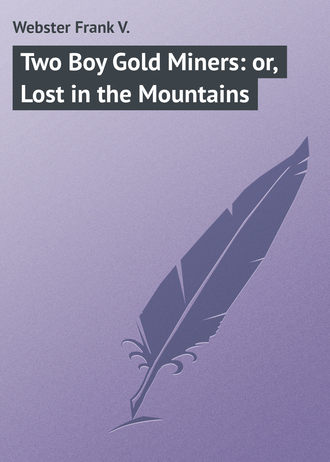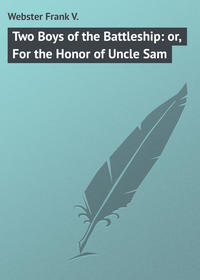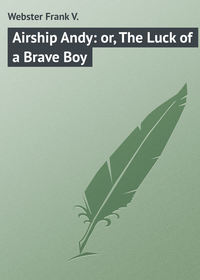 полная версия
полная версияTwo Boy Gold Miners: or, Lost in the Mountains
"What's the pickaxe for?" inquired the boy.
"That's my old pick that I used when I was a miner."
"What are you carrying it with you for?"
"Because that's a lucky pickaxe. Many a hundred dollars' worth of gold has that pick dug for me. I broke the handle, and from then on I had bad luck. But I kept the pick, and some day I may put a new handle on it, and start to mining again."
"Where did you dig gold?" asked Jed, while a curious longing came into his heart to get away from the tiresome farm work and embark upon the free and fascinating life of a prospector. He knew little of such life, or, perhaps, he would not have desired to undertake it, for it is full of hardships and dangers, compared to which farming is easy and simple.
But the meeting that day of the old miner and the two boys was destined to have a far-reaching effect, and the head of the pick, which Gabe Harrison carried mainly for sentimental reasons, played quite a part in the adventures that were soon to follow.
"Where did I dig gold?" repeated Gabe, as he finished tying up his pack. "Well, young man – Jed, I mean, if you'll allow me to call you that – I've dug gold 'most every place there was gold to dig. I'm not particular that way. I've prospected all over the Western part of the United States, and I've even been in Alaska, where I nearly froze to death, but I got a lot of gold there."
"What made you give it up?" asked Jed, becoming more and more interested.
"I didn't. I had bad luck, though it was as much my fault as it was anything else."
"Did some one rob you?"
"Yes, but for the matter of that I gave them the chance. It was mostly my own fault. I'm my own worst enemy, my lad, but I think I've turned over a new leaf, and when Gabe Harrison does the foolish things he used to do, I hope you'll send him a special-delivery letter and tell him so."
"I will, if he leaves me his address," replied Jed, entering into the spirit of the occasion.
"I'll do that. There, your brother has caught the horse. I thought that salt would fetch the critter. I had a mule once – but that's a long while ago. Maybe I'll tell you about it some day."
Will had caught old Pete, and the horse was eagerly licking up the salt from the lad's hat.
"I'll open the bars for you," called Jed, hurrying forward to help his brother. "Is he hurt any?"
"Not a scratch on him."
"That's good. You'd better ride him home, so dad won't be worrying. I'll walk."
"You can ride if you want to," said Will, generously.
"No, you're lighter weight, and it's a hot day. Besides, Pete must be pretty well tired out. Look out he doesn't run away with you again."
"I will. Wish I had a bridle instead of this halter."
"Hold on. I've got one!" exclaimed Mr. Harrison. "It's one that belonged to my mule, but I lost the mule and you might as well take the bridle."
The old miner opened another part of his pack, and took out a strong bridle, that showed some signs of wear. It was quickly slipped on Pete, and then Will, mounting the animal's back, rode off.
"If you'll stop at our house on your way past," he called back to Mr. Harrison, "you can get your bridle."
"All right, I will. Might as well go that way as any other," the man added to Jed, as they started along the highway.
"Haven't you any particular place to go?"
"No, I'm just sort of waiting for something to turn up. I've about made up my mind to get back to the gold country. I heard of some new strikes they were making in Montana, and I've a sort of fever in my blood to get there."
With Jed asking questions, and the old miner giving in answer considerable information about the Western mining country, the two trudged along until they reached the Crosby farm.
"Won't you come in, and have some dinner?" asked Jed, as Will came out to the gate with the bridle. "It's 'most twelve o'clock, and you'll be very welcome. You did us quite a service in helping us to get the horse back. It would have meant a lot to dad to lose him."
"Oh, pshaw! I didn't do anything. But, if you don't mind, I'll sit down and have a bite. It's sort of lonesome, eating all alone beside the road."
"And you promised to tell me how you lost your gold that you dug," said Jed.
"Did I? Well, I don't remember that I did. Still, if you'd like to hear what a foolish man I was, I won't mind telling you."
CHAPTER IV
A CURIOUS STORY
While the old miner was standing at the gate, with the two brothers, Mr. Crosby came out of the house.
"Here is the man who helped us find Pete, father," said Will.
"I'm glad to meet you, sir," responded the farmer heartily, extending his hand. "Won't you come in?"
"I just invited him to dinner, dad," spoke Jed.
"That's right. Come in, Mr. – er – "
"Harrison, Gabriel Harrison, though my pardners and the boys used to call me Gabe. I'm much obliged to you, I'm sure, for your invitation."
"We don't often see strangers out this way," went on the farmer. "I understand you are a miner."
"I used to be, but I'm not much of anything now. I've been prospecting around here lately, looking for something to turn up, but it doesn't seem to be going to. Pretty dry around here, isn't it, Mr. Crosby?"
"Entirely too much so. I don't know what I'm going to do about my crops if we don't get rain soon."
Gabe Harrison looked up at the sky. The sun seemed to be blazing down as hot as ever. The old miner glanced to the various points of the compass. Then he leaned over and gravely felt of his left foot.
"What's the matter? Got a stone bruise?" asked Mr. Crosby.
"No, but I've got a very sensitive corn. It's as good as a barometer. It's beginning to hurt like all possessed, and I shouldn't be surprised if we had a rain storm soon. It always aches as it does now, just before a storm."
"Doesn't it bother you at other times?" asked Jed with a smile.
"Not at all. I think we're going to have rain."
"I certainly hope so," remarked Mr. Crosby. "But you'd better come in now. My wife and daughter have dinner all ready, and I know the women folks don't like to be kept waiting when everything's on the table."
"You're right there, stranger – I mean Mr. Crosby," said Gabe. "I'll come in. Can I wash up a bit? I've got considerable of the dirt of this county spread over my face and hands, only it isn't 'pay dirt.'"
"What's 'pay dirt'?" asked Will
"That, my boy, is what miners call dirt that has gold in it. Many a rocker full I've washed up. Sometimes I'd get a lot of the yellow dust, and, again I wouldn't make enough to buy my bacon. But it's all in the day's work."
Mr. Crosby led his rather queer guest to a shed, where in the summer time the male members of the family washed in preparation for their meals. Mr. Harrison gave himself a vigorous scrubbing with the yellow soap, and polished his face on the coarse towel until his countenance fairly shone. He was a well preserved old man, with a ruddy complexion, that showed through his coating of tan.
"Do you find gold mining pays?" asked Mr. Crosby, after the meal, when the gold-hunter had done full justice to the cooking of Mrs. Crosby and Nettie.
"Yes, about as well as anything – farming, for instance. I suppose your business has its ups and downs."
"Mostly downs. I declare, I never knew such hard times as we're having now! Not only me, but every farmer I know. This long dry spell is likely to have a bad effect on the country."
"I believe you. We miners don't have it all our own way, either."
"I thought you said you had dug plenty of gold," put in Jed, who, with his brother, was an interested listener.
"So I did. But digging it and keeping it are two different things, young man."
"Did you lose what you had?" asked Mr. Crosby, who had heard from his sons something of their guest's history.
"I lost it – yes – in a way. I might as well tell you the story. It's not a very pleasant one. It goes to show that a man can be a pretty big fool when he tries real hard. That's not a very nice thing to say, but it's the truth."
"How did it happen?" asked Will.
"Well, as I've told you, I've been a gold miner for a number of years. I've prospected, or looked for gold, in many places in this country. And I've found my share of yellow nuggets in my time.
"I made my last strike in Nevada. Where I was, nobody thought there was much but silver, but I was lucky enough to come upon a good gold lead, and the vein got bigger the farther I dug. Well, to make a long story short, I took out several thousand dollars in pure gold. Then I lost it."
"Couldn't you find it again?" asked Nettie, who, with her brothers, was eagerly listening to the miner's story.
"No, little miss, I couldn't, for I lost it by gambling."
"Gambling!" exclaimed Mr. Crosby, for he and his wife were strict church people, and did not know much about the vices of the world.
"That's the plain truth. Everybody out West gambles – that is, nearly everybody. There are some exceptions, of course, but I wasn't one. Very foolishly thought I could get something for nothing, and put up my money in a card game."
"And you lost?" inquired Mrs. Crosby.
"Every one but the man running the game loses sooner or later, ma'am," replied the miner. "It's run that way. I lost over a thousand dollars before I had sense enough to quit."
"Oh, then you stopped in time. I'm glad to hear that," said the farmer.
"No, I didn't. I stopped gambling, but I didn't get out of the company of the gamblers, as I should have done. I stayed right there, for I thought I knew it all. Ah, that's a true saying, that there's 'no fool like an old fool,' if you'll excuse me using such language, but I want you boys to take a lesson from me."
"Then how did you lose the rest of your fortune?" asked Jed.
"I was swindled out of it," replied Gabe Harrison. "It was partly my own fault, though. If I had had sense enough to keep away from the gamblers it wouldn't have happened. But one of them proposed a certain deal to me, and I went in with him. When it was all over I found I knew a great deal more than I did at first, but I hadn't any money left."
"They took it all?" asked Mr. Crosby.
"One man got the most of it."
"How?"
"Well, it was an old-time swindle, but I don't believe you'd understand if I told you. Such things aren't good for young people to hear about, anyhow. But I woke up one morning without a cent in my pocket, whereas the night before I had over five thousand dollars in pure gold."
"Five thousand dollars!" murmured Mr. Crosby, to whom such a sum seemed a large fortune.
"Yes. Oh, we didn't think much of that amount in the West. Money was easily made and easily spent there."
"Who got it?" asked Jed, leaning forward in his intense interest in the miner's curious story.
"One man got the most of it."
"Who was he?" inquired Will.
"He went by the name of Con Morton, but I guess he had half a dozen other titles he used whenever it was convenient. Yes, he got most of my fortune by a swindle, and then he lit out. I haven't seen him since. I wish I had. I think I could have made him give me back at least a part of it."
"Where was this?" asked Mrs. Crosby.
"Out in Nevada. Now, I'm afraid I've taken up too much of your time with my foolish story. But maybe it will be a lesson to the boys," and he looked at Jed and Will. "I don't suppose you'll ever go hunting gold, and gambling, but if you do, steer clear of any one by the name of Con Morton."
"I don't believe we'll ever get the chance to hunt gold, Mr. Harrison," replied Jed, "and we certainly won't gamble."
"Stranger things have happened – I mean about hunting gold – but I'm pretty sure if you do find any of the yellow lumps you won't be as foolish as I was, and let a swindler get them away from you. Well, I reckon I'd better be traveling along."
"Are you going to any place in particular?" asked Mr. Crosby.
"No. As I told your boys when I met them looking for the runaway horse, I'm just waiting for something to turn up. I may go back West again, or I may settle down in the East. I'm looking for a job, to tell you the truth. My money is 'most gone, and I need a little to keep me going, though I don't require much to live on."
"Then why don't you stay here?" asked the farmer. "I need a man to help me with the cultivating. I can't pay much – no farmer can these times – but I'll do the best I can. If I had a man to help with the cultivating I could stir the dirt up around the crops, and it wouldn't matter quite so much about the rain. Did you ever work on a farm?"
"Once, when I was a young lad. But if my corn keeps on hurting the way it does, I know we'll have rain."
"I hope so. But would you like to stay here a few days?"
"I think so. In fact, I will. I don't care so much about the money, but I like it here, and it will give me a chance to rest. Yes, Mr. Crosby, I'll stay and help you cultivate. Maybe it will rain, and I can then help you in other ways."
"Perhaps. Then if you'll come with me I'll show you a room you can use."
And so it was settled that the old miner should remain, for the time being, at the Crosby farm.
CHAPTER V
MORE HARD LUCK
That afternoon the two boys went back to the cornfield to resume the cultivating that had been interrupted by the runaway. It seemed hotter than ever, and there was scarcely a breath of wind.
"Whew! This is fierce!" exclaimed Will. "I can't stand it!" and he mopped the perspiration from his forehead.
"Oh, it might be worse," observed Jed.
"Worse? I don't see how."
"You might be out on the Nevada desert that Mr. Harrison was telling about."
"That's so. Well, I'm glad I'm not. But, what do you think of him, anyhow, Jed?"
"I think he's quite a character."
"So do I. I wish I had some of the gold he dug."
"Same here. If we had that we wouldn't have to be working in this hot cornfield. Maybe we'll find some, by and by, Will."
"Find some? How?"
"Why, go after it, to be sure. Do you know, I have an idea I'd like to be a gold miner."
"A heap you know about gold mining!"
"That's all right. Every one has to learn. I guess he didn't know anything about it at first," said the stout youth.
"Perhaps not. But what chance have we to go out West in the mining country?"
"None, I guess, Will, but I can't help thinking of it. I certainly would like to go West and be a gold miner. Think of digging gold instead of potatoes."
"There's only one thing about that," replied his brother, who was not so inclined to look on the rosy side of things, "when you're digging for potatoes you go to a field where potatoes have been planted, and when you dig, you know you're going to get some."
"Well?"
"Well, when you dig for gold you have to go it blind. It may be there and it may not. Oftener not, and you have all your digging for nothing."
"So you do here, sometimes, when the droutht or too much rain has ruined the potato crop," retorted Jed. "I guess it's about an even thing, Will."
"Maybe so. But I guess dad wouldn't let us go West."
"Probably not. Come on, we'll do ten more rows each, and then it will be time to go home to supper. My! But I'm glad this day will soon be over! It's been a scorcher!"
It had been very hot, and the unclouded sun, beating down on the two lads in the cornfield, seemed to fairly be trying to shrivel them up.
"I'm done!" exclaimed Jed at length, as he reached the end of the tenth row, which he had set as his "stent."
"So'm I," added his brother a minute later. "Come on, Pete. You're moving slow on account of the run you had this morning. Hark! What's that, Jed?"
"Sounded like thunder."
The two brothers listened a moment. Off in the west there was a dull rumble, where some copper-colored clouds had gathered.
"It is thunder!" exclaimed Will. "Say, I do believe it's going to rain. Won't dad be glad!"
"He sure will," spoke Jed.
"But I'm afraid it's too late to do any good," went on Will.
"Nonsense! There you go again. Always looking on the dark side of things. Why don't you say the rain will do all sorts of good?"
"I suppose I'm not built that way. But I hope it does."
"Of course it will. Come on. Let's hurry up. I don't want to get wet."
"I'll be glad to," declared Will. "Seems as if I never was so hot. I'd like to get in a tubful of ice water and stay there an hour or so."
As the lads unhitched the horses from the cultivators, leaving the machines in the field, in readiness for the work on the next day, and started homeward with the steeds, the rumble of thunder became louder, and there were flashes of lightning in the western sky.
"She's a-coming!" cried Jed. "It'll be a corker, too, after this long dry spell."
The boys had scarcely reached home before it began to rain. First there were only a few large drops, each the size of a half dollar. There was no wind, and the crack of thunder seemed like the discharge of heavy guns.
Then the trees began to bend before the blast. The wind howled through their branches. The dust from parched fields and long dry highways rose in big clouds, making a yellow haze as the sun shone through it. Then the sky was quickly overcast with a yellow cloud. The wind blew harder. Louder crashed the thunder and then, with a rushing, hissing sound, the rain fell in torrents.
"Just in time!" cried Gabe Harrison, as the boys, having put the horses in the barn, rushed up on the side porch of the farm house. "This is going to be a great shower. I knew my old corn wasn't aching for nothing."
"I guess your corn isn't any gladder of the rain than the corn we've been cultivating all day," retorted Jed. "It was almost parched with the heat."
"This will be a godsend to us farmers," spoke Mr. Crosby, as he came out to see the storm. "It would have been worth a lot more had it come sooner, but it will save part of my crops for me."
There was another crash of thunder, and it seemed as if several clouds, right overhead, opened and let out their flood of rain, so fiercely did the big drops dash down.
"Nettie, are all the windows shut?" asked Mrs. Crosby of her daughter.
"Yes, ma. I looked to 'em when I saw the shower coming up. They're all closed."
"Are you sure you shut the one in my bedroom?"
"Yep."
"I'm afraid you didn't. I'm going to look, and make certain."
If there was one worry Mrs. Crosby had, it was that the windows were not shut when a storm came up. She was afraid of the rain coming in, and she was also afraid of lightning, for, like many country women, she believed the electrical current only waited for the chance of darting in an open window to wreak damage. So she hurried off to oversee the work her daughter had said was already done.
The storm became worse. The farmer and his two sons, who, with the old miner, were watching it from the side porch, had to go in, as a shift of the wind sent the rain into their shelter.
"Now if this will keep up all night, we'll have water enough," commented Mr. Crosby.
"Do you need as much as that?" asked Gabe.
"Yes, and more too. Half the springs around here are dried up. Our well didn't have much more water in it, and the creek was lower than I ever saw it before."
They went inside the house. Mrs. Crosby finished her supervision of the windows, and came into the sitting-room, where the others were gathered.
"Jed," she called to her eldest son, "don't sit so close to the window."
"Why not?"
"You might be struck. Lightning always comes in a window."
"But this one is closed."
"That doesn't matter. Come away, do, please."
Not wanting to worry his mother, Jed obeyed. Hardly had he moved back when there came a terrific crash. It was so loud, and sounded so close, that, for a moment, every one in the room was stunned.
"That struck somewhere around here!" cried Mr. Crosby, as soon as the rolling thunder sound had died away.
"I should say so!" added Will. "You can smell the sulphur."
There was a noticeable odor in the room, like when an old-fashioned match is lighted.
"Oh, dear! I'm afraid it hit the house!" cried Mrs. Crosby. "We'll all be killed!"
"If it struck the house we wouldn't be sitting here," replied Jed. "We'd be knocked off our chairs. Come on, Will, we'll go see what damage it did."
Following that one terrible clap the storm seemed to let up a bit, though it rained harder than ever. The two boys, taking heavy coats, from nails in the kitchen, went out. No sooner had they reached the porch than Jed cried:
"It struck our cow barn! The place is on fire! Come on and get the cow out!"
His cry was heard in the sitting-room, and his father and the miner ran out. They did not need to be told what had happened. The cow shed, a small structure, near the barn, but not attached to it, was in flames.
"We must save the cow!" exclaimed Mr. Crosby. "She's worth fifty dollars!"
The men and boys rushed to the little stable. The lightning had torn out one complete side, and it was burning fiercely in spite of the drenching rain. But one look inside showed Mr. Crosby that more bad luck had come to him. Though the rain had arrived in time to save part of his crops, the lightning had struck the cow, and the poor creature was stretched out dead on the floor of the small stable.
CHAPTER VI
THE GOLD STRIKE
"You can't save that cow, Mr. Crosby!" cried Gabe Harrison. "Come on, boys, get pails and we'll see if we can't put out the fire! Where's there a well or a cistern?"
"Right over this way," replied Jed.
"More trouble!" exclaimed Mr. Crosby bitterly, as he saw his property being consumed by the flames, and thought of the dead cow.
Soon the two boys and the old miner had secured buckets and were dashing water on the flames. They might have saved themselves the trouble, however, for there came such a deluge of rain a few minutes later that the fire was extinguished.
"Well, I guess we can't do any more good out here," observed Mr. Harrison.
"No, nothing more can burn in this storm," added Will. "Lucky it didn't strike the barn."
"That's so," agreed Jed. "This is as close as I want lightning to come to me."
"It's too bad about your cow, friend Crosby," spoke the miner, as the four splashed through the water and mud back to the house.
"Indeed it is," admitted the farmer. "She was a valuable animal, and supplied us with all our milk and butter. Now I'll have to buy a new one, and I don't see where I'm going to get the money these hard times."
The boys felt their father's loss keenly, and they wished they could do something to aid him. When they reached the house they found Mrs. Crosby on the verge of hysterics, with her daughter vainly trying to quiet her.
"Some one is killed! I know there is!" exclaimed the nervous woman. "I'm sure some one is killed!"
"Only the cow, mother," replied Jed. "It might have been worse. We still have the pigs left. They seemed to like this rain, for they're out in the open part of their pen, getting a good soaking."
"Oh, Jed! How can you joke at such a serious time as this?" asked Nettie, reproachfully.
"Might as well joke as cry," answered her brother.
"That's the right view to take of it," put in old Gabe. "Always look on the bright side of things. Of course, it's too bad to lose a valuable cow, but it might have been worse. I had a partner prospecting with me once. He got careless with some dynamite, and it blowed our shanty to pieces. We had narrow escapes. But do you think my partner worried over it? Not a bit. He said he was thinking of building a new shanty, anyhow, and the dynamite blast saved him the trouble of tearing the old one down."
"That must be a dreadful country, out in the mining region," remarked Mrs. Crosby, who had somewhat recovered her composure.
"Oh, it's no worse than lots of other places, ma'am. If a man, or a boy either, for that matter, behaves himself and minds his own business, he'll get along all right. I wish I was back there, that's what I do. But listen to that rain! It's a regular cloudburst. I guess you'll get all you want, Mr. Crosby."
"Yes, the rain will do all sorts of good."
"That'll make up for the cow, dad," put in Jed, determined to look on the less gloomy side. "Then we can sell the hide to the butcher, so it won't be a total loss."








